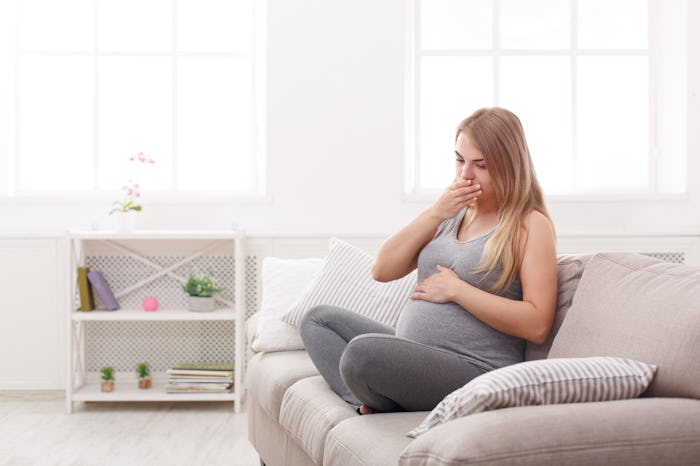Life

OK, So There *Might* Be A Reason Why You Puke More When You're Carrying A Girl
I had severe morning sickness with my pregnancies, and I hated every minute of that "glowing" time. But my first pregnancy with my son was even worse than being pregnant with my daughter. When I tell people this, they're shocked. It turns out that there is a commonly held belief that morning sickness is worse with a girl. You know, that whole "she's stealing your beauty" thing that's so refreshing to hear when you actually waddle.
There are a ton of old wives' tales regarding the prediction of gender in a baby from the pre-ultrasound world. Everything from the way a mother carries her pregnancy to complex charts drawing on the mother and father's age and birthday are supposed to guess the baby's sex. The idea that your morning sickness will be worse with a girl seems to be just another old wives' tale — kind of. Jeanne S. Sheffield, Division Director of the Maternal-Fetal Medicine department at Johns Hopkins, tells Romper there's "no scientific evidence" to prove that a female fetus will specifically cause morning sickness. "Women carrying a male or female both have morning sickness unfortunately. The level of the beta-hcg hormone influences morning sickness — e.g. people with multiple gestation often have earlier or worse morning sickness."
But in another theory about morning sickness and girls, the old wives might be right. A recent Swedish study found that there is a strong correlation between live girl births and the condition of pregnancy known as hyperemesis gravidarum, a particularly nasty form of severe morning sickness.
The study noted that nausea and vomiting in pregnancy is really common, with almost two-thirds of women experiencing it in some degree. However, the severe form, hyperemesis gravidarum, accounts for only 7 percent of pregnancies, with a strong preference for girl pregnancies. Researchers reported, "There is a marked increase in the probability of observing a girl at (live) birth among those admitted for HG in the first trimester. The coefficient estimates indicate that HG in the first two months of pregnancy raises the proportion of girls at birth by 7 percentage points, from 48.7 percent to approximately 56 percent."
But that's not all. When examining the question of morning sickness being worse with a girl, there are even more factors in play. According to a report by the BBC, girl babies begin producing female hormones while in the womb, and that extra flood of estrogen and progesterone in the mother's womb might bear part of the responsibility for the mom becoming more sick when she's pregnant with a girl than she is with a boy. But because we don't really know what causes the nausea and vomiting of pregnancy, it's mostly just speculation at this point.
Dr. Danielle DonDiego, a family physician, tells Romper that the ACOG has reported that women carrying a female may experience worsening morning sickness. But she also says there are other risk factors, like "carrying multiple fetuses, having morning sickness in a previous pregnancy, and if your mother or sisters also had morning sickness with their pregnancies despite the sex. Other risk factors are history of motion sickness or migraines in the mother." Oh great, so morning sickness is passed down from — wait for it — mother to daughter, noted a study in BMJ. That means I can not only thank my mother for my complete lack of ankles, but also my hyperemesis. Thanks, Mom. Women born to women who had severe nausea and vomiting with pregnancy are 73 percent more likely to develop the disorder than women not born to women who've had it, noted an article in Nature.
The same study also found that it might have a genetic component researchers had not found previously. They found that two genes, GDF15 and IGFBP7, both "involved in placentation, appetite, and cachexia," also likely have roles in the nausea and vomiting associated with pregnancy, specifically the severe form of hyperemesis.
It's a continually perpetuating issue. A woman who has morning sickness gives birth to a daughter who grows up to be a woman with morning sickness. It's entirely unfair, but honestly, not much about being a pregnant woman is fair, right? Thankfully, it clears up with childbirth, otherwise I don't think anyone would volunteer for the job.
Experts:
Dr. Jeanne S. Sheffield, Director of the Division of Maternal-Fetal Medicine, Professor of Gynecology and Obstetrics at Johns Hopkins
Dr. Danielle DonDiego, family physician
Studies referenced:
Almond D, Edlund L, Joffe M, Palme M. (2016) An adaptive significance of morning sickness? Economics & Human Biology, https://www.sciencedirect.com/science/article/pii/S1570677X16300028.
Vikanes A, Skjaerven R, Grjibovski A, Gunnes N, Vangen S, Magnus P. (2010) Recurrence of hyperemesis gravidarum across generations: population based cohort study. The BMJ, https://www.ncbi.nlm.nih.gov/pmc/articles/PMC2862151/.
Fejzo M, Sazonova O, Sathirapongsasuti J, Hallgrimsdottir I, Vacic V, MacGibbon K, Schoenberg F, Mancuso N, Slamon D, Mullin P, 23andMe Research Team. (2018) Placenta and appetite genes GDF15 and IGFBP7 are associated with hyperemesis gravidarum. Nature Communications, https://www.nature.com/articles/s41467-018-03258-0.
This article was originally published on